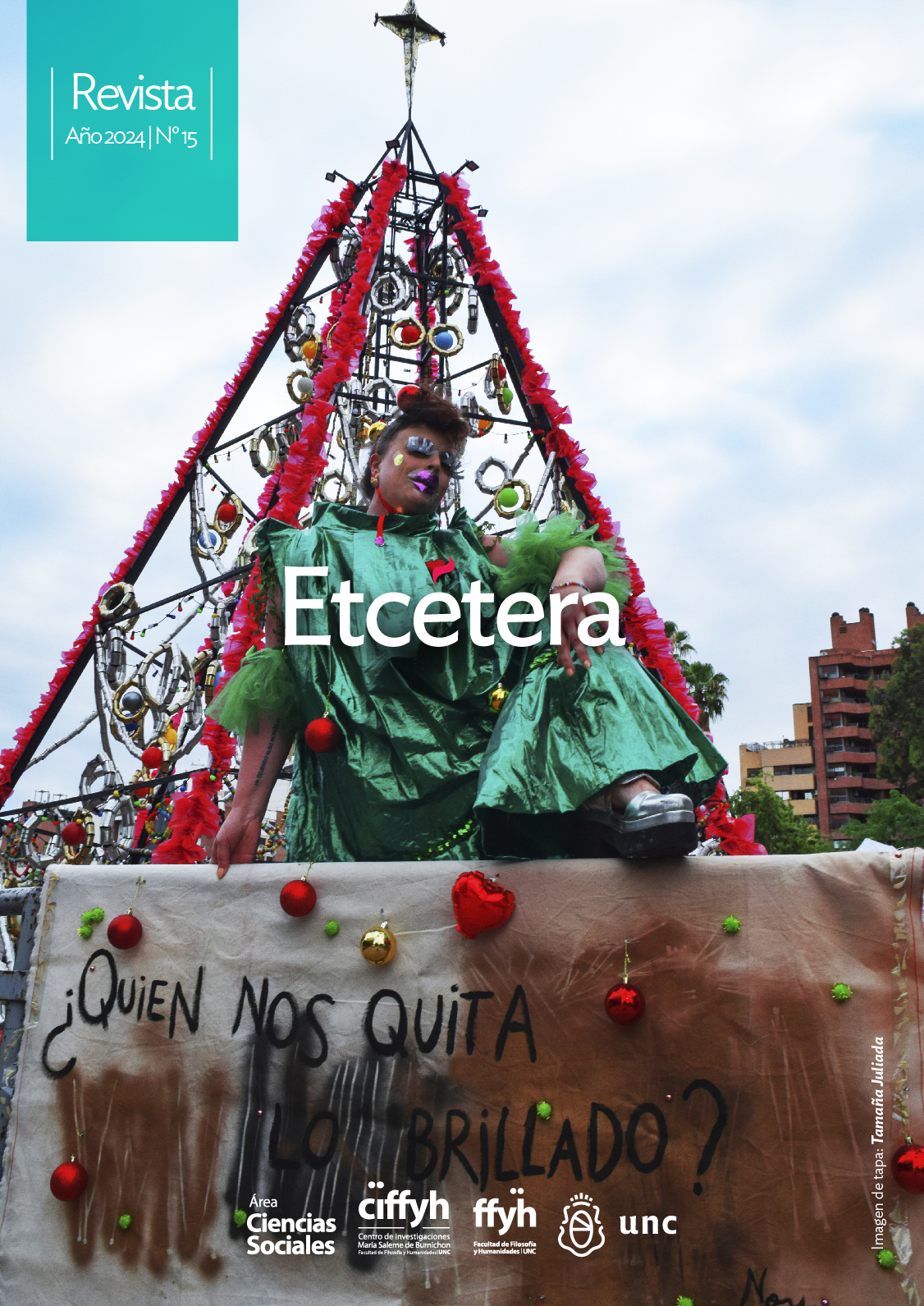“I threw up because I was nervous and said I'm a fag”: reflections on the affective economy of disgust
Keywords:
disgust, homophobia, agency, affective economyAbstract
In 2022, musician Marilina Bertoldi gave an interview where she is asked about Sunchales, the town in the province of Santa Fe, Argentina, where she grew up. Then, in a comment about her lesbian childhood, Bertoldi relates: “The day I realized it, I threw up because I was nervous and said I'm and said I am a fag”. In this paper, we will examine some fragments of that interview in order to investigate particularly the homophobic disgust directed at oneself. We will be interested in problematizing the consequences of thinking disgust as a mere involuntary reaction of the body, a “natural” visceral response, completely disconnected from everything, immediate. Following theorizations on the cultural, social and political dimensions of disgust, we will give an account of how viscerality, implied in moral judgments that use the dialect of disgust, gives them an appearance of truth and neutrality that ends up naturalizing the cisheterosexual matrix. At the same time, it leaves homosexuality on the side of the disgusting, the unnatural, giving rise -not infrequently- to its pathologization, criminalization and prohibition from the public space. We will ask ourselves, then, how does someone come to feel disgust at his or her desire to deviate from heterosexuality, what affective ambivalence does disgust have, what agency is possible from this profoundly conflictive experience? We will try to expose, relying on Sara Ahmed, the affective economy of disgust and the ways in which disgust operates as a heterosexualizing device within a cisheterosexist affective configuration.
Downloads
References
Ahmed, S. (2004). Affective economies. Social Text, vol. 22, núm. 2, pp. 117-139. Durham: Duke University Press. https://doi.org/10.1215/01642472-22-2_79-117
Ahmed, S. (2015 [2004]). La política cultural de las emociones. México: Programa Universitario de Estudios de Género, UNAM.
Ahmed, S. (2019 [2010]). La promesa de la felicidad. Buenos Aires: Caja Negra.
Barzani, C. A. (2007, 8 de noviembre). Una reflexión sobre los discursos PARA DEFINIR MEJOR EL PREJUICIO SEXUAL. Página 12. Buenos Aires, Argentina. https://www.pagina12.com.ar/diario/psicologia/9-94289-2007-11-08.html
Notas de Periodismo Popular (2014, 17 de noviembre). Besos contra la discriminación a una pareja de lesbianas en Kentucky (la pizzería). Notas de Periodismo Popular. Argentina.
Butler, J. (2002 [1993]). Cuerpos que importan: sobre los límites materiales y discursivos del “sexo”. Buenos Aires: Paidós.
Butler, J. (2009 [1997]). Lenguaje, poder e identidad. Madrid: Síntesis.
Filo News. (2022, 23 de marzo). Marilina Bertoldi: “La lucha que puedo dar es contra la falta de diversidad”. [Archivo de video]. Youtube. https://www.youtube.com/watch?v=p0twB0zpgyw
flores, v. (2021). Romper el corazón del mundo: modos fugitivos de hacer teoría. Buenos Aires: La Libre.
Gabriel Lucero. (2023, 27 de mayo). Bicho feo [Archivo de video]. YouTube. https://www.youtube.com/watch?v=8TfunjFh3V4
Gould, D. (2009). Moving politics: emotion and ACT UP’s fight against AIDS. Chicago: University of Chicago Press.
Gregg, M. y Seigworth, G. J. (eds.). (2010). The affect theory reader. Durham: Duke University Press.
Lupton, D. (2015). The pedagogy of disgust: the ethical, moral and political implications of using disgust in public health campaigns. Critical Public Health, vol. 25, núm. 1, pp. 4-14. Taylor & Francis. https://doi.org/10.1080/09581596.2014.885115
Macón, C. (2013). SENTIMUS ERGO SUMUS: El surgimiento del “giro afectivo” y su impacto sobre la filosofía política. Revista Latinoamericana de Filosofía Política, vol. II, núm. 6, pp. 1-32. Buenos Aires: CIF. http://rlfp.org.ar/revista/index.php/RLFP/article/view/49
Macón, C. (2021). Desafiar el sentir. Feminismos, historia y rebelión. Buenos Aires: Editorial Omnívora.
Malatino, H. (2021). The promise of repair: trans rage and the limits of feminist coalition. Signs. Journal of Women in Culture and Society, vol. 46, núm. 4, pp. 827-851. Chicago: University of Chicago Press. https://www.journals.uchicago.edu/doi/abs/10.1086/713292
Meagher, M. (2003). Jenny Saville and a feminist aesthetics of disgust. Hypatia, vol. 18, núm. 3, pp. 23-41. UK: Cambridge University Press. https://doi.org/10.1111/j.1527-2001.2003.tb01411.x
Miller, W. I. (1998). Anatomía del asco. Madrid: Santillana.
Muñoz, J. E. (2020). The sense of brown. Editado por J. Chambers-Letson y T. Nyong’o. Durham: Duke University Press.
Premios Gardel. (2020, 23 de junio). Marilina Bertoldi gana Álbum del año Gardel de Oro | Premios Gardel 2019 [Archivo de video]. YouTube. https://www.youtube.com/watch?v=xI6Fk7f2ABU
Real Academia Española. (s/f). Homofobia. En: Diccionario de la lengua española. https://dle.rae.es/homofobia?m=form Recuperado en 18 de mayo de 2023.
Rodrigues, C. y Gruman, P. (2021). Do abjeto ao não-enlutável: o problema da inteligibilidade na filosofia de Butler. Anuário Antropológico, vol. 46, núm. 3, pp. 67-84. Brasilia: Universidade de Brasília. https://doi.org/10.4000/aa.8933
Schaefer, D. O. (2022). Wild experiment: feeling science and secularism after Darwin. Durham: Duke University Press.
Schuller, K. (2017). The biopolitics of feeling. Race, sex, and science in the Nineteenth Century. Durham: Duke University Press.
Sedgwick, E. K. (1990). Epistemology of the closet. Berkeley: University of California Press.
Tortorici, Z. (2014). Visceral archives of the body. Consuming the dead, digesting the divine. GLQ. A Journal of Lesbian and Gay Studies, vol. 20, núm. 4, pp. 407-437. Durham: Duke University Press. https://doi.org/10.1215/10642684-2721375
Tyler, I. (2013). Revolting subjects. Social abjection and resistance in neoliberal Britain. Londres: Zed Books.
Warner, M. (2002). Publics and counterpublics. Nueva York: Zone Books.
Yona, Y. V. (2024). Nuevas derechas y disidencias sexuales, ¿puede el asco ser no solo índice sino factor de crisis? Ponencia presentada en Primeras Jornadas de Teorías Tortilleras: memorias, errancias y vísceras conceptuales. Facultad de Filosofía, Humanidades de la Universidad Nacional de Córdoba, Argentina.
Downloads
Published
Issue
Section
License
Copyright (c) 2024 Etcétera. Revista del Área de Ciencias Sociales del CIFFyH

This work is licensed under a Creative Commons Attribution-NonCommercial-ShareAlike 4.0 International License.
Aquellos autores/as que tengan publicaciones con esta revista, aceptan los términos siguientes:
- Los autores/as conservarán sus derechos de autor y garantizarán a la revista el derecho de primera publicación de su obra, el cuál estará simultáneamente sujeto a la Licencia de reconocimiento de Creative Commons que permite compartir, copiar, distribuir, ejecutar y comunicar públicamente la obra, siempre que: 1) se cite la autoría y la fuente original de su publicación (revista, editorial y URL de la obra); 2) no se use para fines comerciales; 3) En caso que se transforme o genere una obra derivada a partir de esta obra, deberá compartise bajo las mismas condiciones establecidas por esta licencia.
- Los autores/as podrán adoptar otros acuerdos de licencia no exclusiva de distribución de la versión de la obra publicada (p. ej.: depositarla en un archivo telemático institucional o publicarla en un volumen monográfico) siempre que se indique la publicación inicial en esta revista.
- Se permite y recomienda a los autores/as difundir su obra a través de Internet (p. ej.: en archivos telemáticos institucionales o en su página web) luego de la publicacion del articulo, lo cual puede producir intercambios interesantes y aumentar las citas de la obra publicada. (Véase El efecto del acceso abierto).
- El titular del copyright es Etcétera. Revista del Área de Ciencias Sociales del CIFFyH.



















